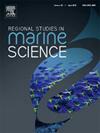Rent-seeking behavior of ship sulfur emission detection based on evolutionary game theory
IF 2.1
4区 环境科学与生态学
Q3 ECOLOGY
引用次数: 0
Abstract
The “IMO 2020 sulphur limit” is an important means to promote sulfur emission reduction in shipping, and the real oil inspection report is the basis for the realization of the IMO 2020, however, shipping companies and third-party fuel testing agencies conspire to falsify the oil inspection report. Therefore, this paper establishes a three-party game model between shipping companies, third-party fuel testing agencies and maritime management agencies based on prospect theory to study rent-seeking behaviour. On this basis, this model conducts a systematic analysis of the strategy selection and conditions for evolutionary stability among the three parties, and elucidates the underlying principles driving the evolutionary trends of each entity within the shipping system. Finally, a simulation analysis is conducted based on a real-world case of a ship's fuel sulfur emissions exceeding the standard to make suggestions for the maritime management agencies. The results show that:1) When shipping companies and maritime regulatory authorities exhibit a heightened awareness of risk aversion, they are inclined to refrain from adopting strategies that could entail potential risks, even if such strategies may yield substantial short-term gains.2) The price differential between high-sulfur and low-sulfur fuels constitutes a critical determinant influencing the decision-making processes of shipping companies. Additionally, factors such as the potential loss of corporate reputation, the likelihood of crew members actively reporting violations, and the implementation of a punitive feedback mechanism influence the degree to which shipping companies adhere to standardized operational practices.3) Testing cost represents a pivotal factor influencing the operations of third-party testing institutions.4) The choice of Maritime management agency is related to the cost of strict regulation, the fines by higher governmental authorities and environmental governance cost, and these factors exhibit distinct thresholds.
求助全文
约1分钟内获得全文
求助全文
来源期刊

Regional Studies in Marine Science
Agricultural and Biological Sciences-Ecology, Evolution, Behavior and Systematics
CiteScore
3.90
自引率
4.80%
发文量
336
审稿时长
69 days
期刊介绍:
REGIONAL STUDIES IN MARINE SCIENCE will publish scientifically sound papers on regional aspects of maritime and marine resources in estuaries, coastal zones, continental shelf, the seas and oceans.
 求助内容:
求助内容: 应助结果提醒方式:
应助结果提醒方式:


